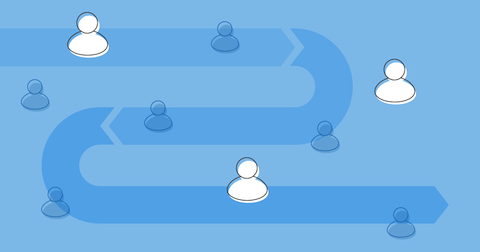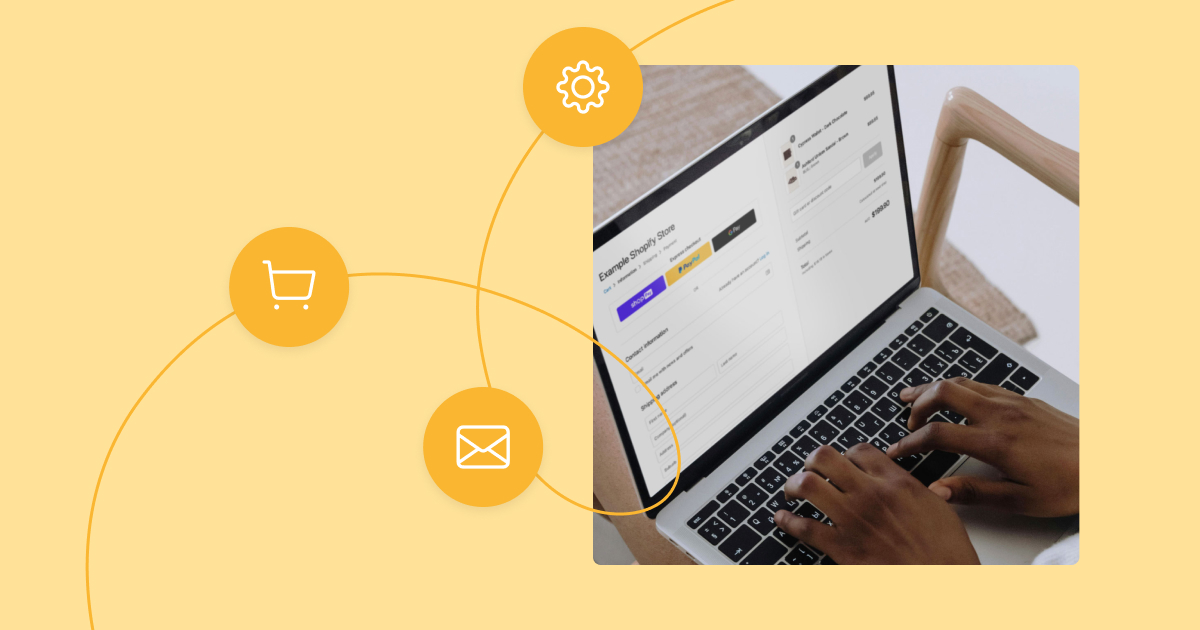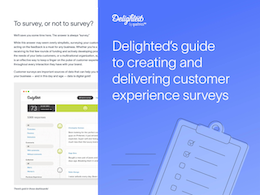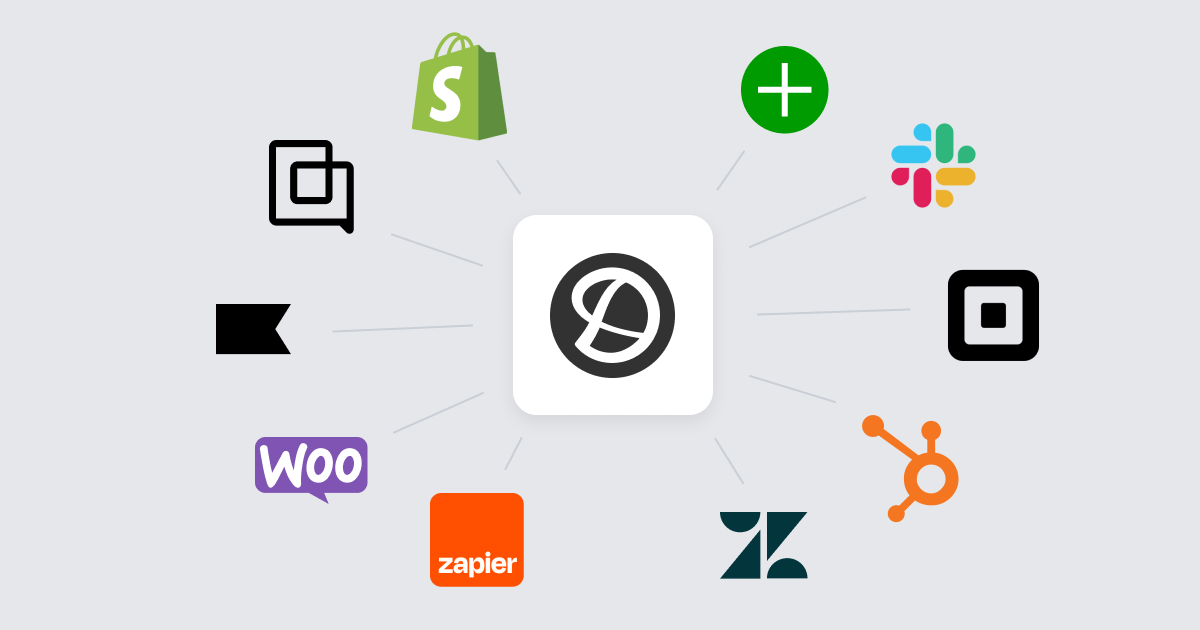There’s no doubt that ecommerce is a booming industry: with online shopping becoming the default purchasing method for many, businesses are focused on optimizing their online storefronts and ensuring buying experiences are as smooth as possible.
How do they do this? Likely with the help of ecommerce integrations, which connect everyday ecommerce tools and centralize data to streamline operations, automate workflows, and increase efficiency.
Keep reading to uncover the definition, benefits, and types of ecommerce integrations you need to optimize the customer experience and take your business to the next level.
What is an ecommerce integration?
Ecommerce integrations connect your online business with applications that allow you to operate and manage your ecommerce platform more efficiently, with easy access to inventory, invoices, shipments, orders, and customer information in one location instead of multiple. This ranges from apps that manage payment processing when a customer purchases to how they are surveyed post-purchase.
Comprehensive integrations are essential for ecommerce companies, especially when it comes to managing the ongoing connection between a business’ front-end (like their website) and back-end (like their customer relationship management, or CRM, software). With the right ecommerce integrations, businesses streamline operations, enhance customer experience, and enable omnichannel retail.
Benefits of ecommerce integrations: Why they matter
Integrating with automation tools can make managing your ecommerce business a smooth process. Take a look at some of the top benefits of ecommerce integrations below.
Ensured data accuracy
With ecommerce integrations, there’s no longer a need for manual data entry; you can sync customer data – like purchase information or feedback – across multiple applications without lifting a finger. Relying on integrations for ecommerce operations reduces the likelihood of human error and leads to more accurate data.
Centralized customer data
When you have a robust tech stack, it’s harder to consolidate customer information across various tools. With integrations, you can sync customer data like order history and open support tickets across multiple platforms so everyone can see the data that matters.
Increased efficiency
Syncing information across applications and automating workflows contributes to the greater benefit of ecommerce integrations: increased efficiency. When your internal team members save time on manual tasks, they can spend more time on the projects that build your business and grow your customer base.
Improved customer experience
Having all the information you need in one place allows you to quickly resolve immediate customer issues and holistically address larger, negative experiences.
For example, integrating survey automation into your CRM platform lets you consistently monitor feedback throughout the entire ecommerce journey. This centralized feedback helps you identify and improve problems earlier (like confusing site navigation or an inefficient checkout process) and increases the likelihood of repeat customers.
Another benefit of integrating customer data across various sales channels (e.g. online, mobile, or in-store) is connecting customers with products they are unaware of but could find useful. For instance, you can upsell related products based on their recently viewed items, ensuring they are presented with the best options available on your online store.
7 popular types of integrations for ecommerce businesses
Now that we’ve covered the benefits of integrating your tech stack, the following list can help you distill the exact integrations you might need for your ecommerce business.
1. Website builder solutions
The heart of ecommerce experience is the quality of your online storefront. Integrating with website builders like Shopify, WooCommerce, or Squarespace lets you benefit from their sophisticated ecommerce platforms that help build your store, operate the checkout process, and keep track of customer data in the background.
Jump into Delighted’s website builder survey integrations:
2. SMS marketing tools
When it comes to omnichannel retail marketing, many customers prefer to be contacted via text message as opposed to other channels. SMS marketing is on the rise, and integrating with tools that facilitate it is more important than ever. With an SMS marketing platform like Klaviyo or Gorgias, you can contact customers once their order is placed or delivered with a survey request or referral code.
Jump into Delighted’s SMS marketing tool survey integrations:
3. Email marketing solutions
While SMS marketing is a popular form of customer engagement, email marketing is a tried and true method of nurturing your customer base. Arguably one of the most popular types of ecommerce integrations, email marketing platforms like Mailchimp and ActiveCampaign automate email delivery based on specified points in the customer journey – from cart abandonment to product satisfaction.
Jump into Delighted’s email marketing survey integrations:
4. Payment gateways
Keep track of customer orders and invoices as they come in with payment gateway integrations like Square and Stripe. This type of ecommerce data integration centralizes customer purchase information as well as the status of each and every transaction. Once a customer has completed the checkout process, this could be an opportunity to ask for feedback on the purchasing process with an ecommerce survey integration.
Jump into Delighted’s payment gateway survey integrations:
5. Customer support management
One of the most important parts of customer retention is solving customer problems as soon as they arise. To do so, you need the right platform for customers to submit tickets with their issue – like Zendesk or Gladly. These ecommerce solutions help manage high ticket volume and allow you to close the loop as efficiently as possible.
Jump into Delighted’s customer support management survey integrations:
6. Customer relationship management
Perhaps the most valuable type of ecommerce integration is customer relationship management (CRM) software. When your online store integrates with CRM software like Salesforce or HubSpot, you can keep track of all customer interactions with your brand and keep their information readily available in their profile.
Jump into Delighted’s CRM survey integrations:
7. Experience management solutions
Complete your ecommerce platform by implementing a feedback program for customer experience management. A survey solution like Delighted helps track customer sentiment from the moment they become aware of your brand to when they click “submit order” on your checkout page. Our ecommerce survey templates help kickstart your experience management program in minutes, not days.
Automate your workflows with ecommerce integrations
Integrating with the right tools can give your ecommerce business a competitive advantage in a growing marketplace. With benefits like increased efficiency and automated workflows, ecommerce integrations can enhance customer experiences and improve retention rates.
Keep a pulse on ecommerce experience with our survey templates and integrate Delighted with your favorite ecommerce platforms mentioned above. Get started for free today!






